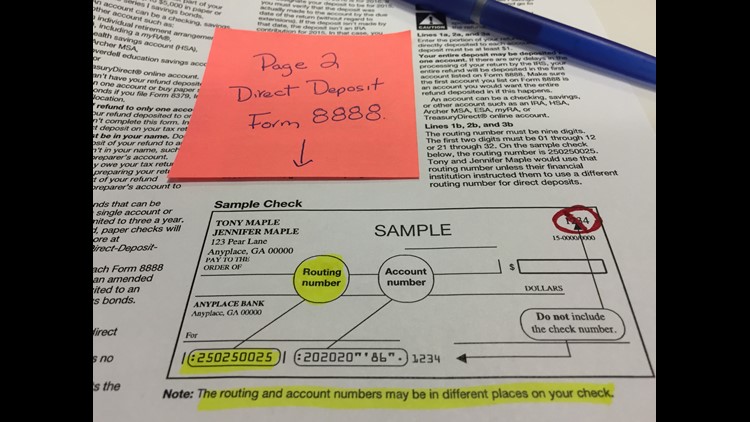Direct deposit sounds like a no-brainer when it comes to getting a tax refund. Who would want to waste time and keep running to the mailbox to keep an eye out for a fat tax refund check?
But it's not foolproof. Ever think about what happens if you enter the wrong account number? Or if somehow that refund is deposited into someone else's account?
"It may not happen very often, but when it happens to you, it's a very big deal," said Steve Kenneally, vice president of the American Bankers Association.
The IRS warned taxpayers this year that listing incorrect bank account information is among the top 9 common errors to avoid. Other common errors include: not signing the forms, giving wrong Social Security numbers and spelling a dependent's name wrong (or in a different way than it shows up on the person's Social Security card).
Oops, I goofed. Now what?
Give the IRS the wrong bank account number? Unfortunately, there is not a way to change it after e-filing that return.
If you spot trouble immediately, you might have a chance at stopping the direct deposit. If the tax return has not already posted to its system, you can ask the IRS to stop the direct deposit by calling 800-829-1040 from 7 a.m. to 7 p.m. on weekdays.
The bank isn't required to match up the name on the account to the account number. In some cases, the bank might refuse the direct deposit. But in many cases, it goes to the account number provided, Kenneally said.
Eight out of 10 taxpayers use direct deposit to get their federal income tax refunds. Taxpayers can request direct deposit even if they still file an old-fashioned paper return.
Direct deposit is promoted as a way to avoid waiting a long time for a tax refund and stop thieves who go through mailboxes.
Before you file a return, see page 2 of the regular 1040 form in the refund section. On Line 76b, you list the routing number of your bank and check a box marked "c" for whether the account is for checking or savings. You'd list your bank account number on Line 76d.
You might also need Form 8888 for the Allocation of Refund, which is used to split your refund among two or three bank accounts.
Check that routing number
Kenneally said consumers should talk with their banks to make sure the routing number on the check is the same routing number that would be used for direct deposit. In most cases, it is. But some banks use different routing numbers for direct deposit.
Avoiding a direct deposit glitch is far easier than trying to correct a problem afterward.
"I had one client a few years ago where I entered the wrong account number," said Frank St. Onge, enrolled agent for Total Financial Planning.
The tax refund ended up ultimately being sent by mail from the IRS, after the bank returned the money to the IRS noting that this was not the correct account.
"That has made me be very sensitive to checking the numbers," St. Onge said.
George W. Smith IV, a certified public accountant at George W. Smith & Co., said sometimes it can be hard to pinpoint the trouble spot.
"If you go to “Where’s my Refund” on irs.gov it will show your refund has been processed even if it goes to the wrong account," Smith said.
You can view "Where's My Refund?" at www.irs.gov/refunds within 24 hours after the IRS received your e-filed return or four weeks after mailing in a tax return.
You may have a fight on your hands
How much trouble tax filers run into, of course, will depend on each situation.
Some taxpayers have ended up waiting up to three months or so for a tax refund check after running into direct deposit snags.
"Needless to say it’s not a fun endeavor," Smith said.
The IRS notes that if you incorrectly enter an account or routing number that belongs to someone else and your financial institution deposits the money into someone else's account, you must work with the bank to recover your money. If you contact the bank and two weeks have passed with no results, file Form 3911 "Tax Statement Regarding Refund."
"However, if funds are not available or the bank refuses to return the funds, the IRS cannot compel the bank to do so," the IRS states online.
"The case may then become a civil matter between you and the financial institution and/or the owner of the account into which the funds were deposited," the IRS warned.
Typically, you can get a tax refund within 21 days. But the IRS has warned online that taxpayers should not count on getting a refund by a certain date to cover major purchases or bills. Various delays can have you waiting longer than expected.
First thing before filing that return: Double check the bank account information involving direct deposit, so you don't contribute needlessly to any delays.
Contact Susan Tompor: 313-222-8876 or stompor@freepress.com. Follow Susan on Twitter @Tompor.
Upcoming Tax Chat
Susan Tompor will host a web chat from noon to 1 p.m. on April 7 to take tax-related questions. Guests will be Luis D. Garcia, of the Internal Revenue Service office in Detroit, and George W. Smith IV, a certified public accountant at George W. Smith & Co. P.C. in Southfield.
Here's a link to the live chat, which will take place on April 7: http://live.freep.com/Event/Get_answers_to_your_tax_questions

![How to avoid trouble with direct deposit of tax refunds [image : 82346290]](http://www.gannett-cdn.com/-mm-/e3efedcef3c478468d14da912d933aa9e87aa130/c=196-0-2985-2384/local/-/media/2016/03/28/DetroitFreePress/DetroitFreePress/635947703481971388-FullSizeRender.jpg)


